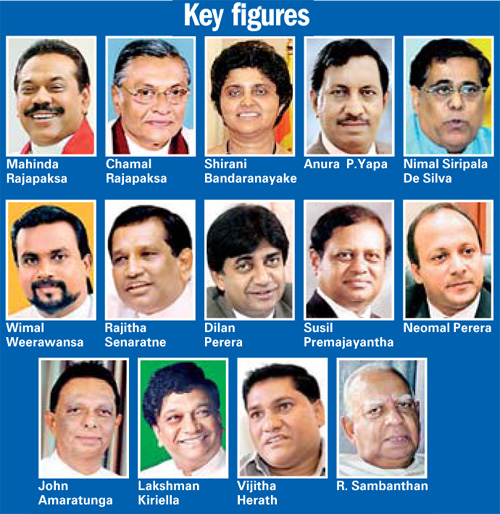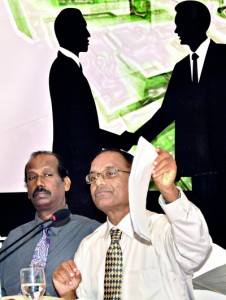Judicial independence – Talk to your neighbour
 One of the most effective ways of countering the gradual erosion of judicial independence in Sri Lanka is to ‘talk’ about it, according to a constitutional expert.
One of the most effective ways of countering the gradual erosion of judicial independence in Sri Lanka is to ‘talk’ about it, according to a constitutional expert.
“It’s a fallacy which some want to instill as public opinion saying that ‘people aren’t interested in the impeachment motion against Chief Justice, Dr. Shirani Bandaranayake’ or that ‘people are not aware of it’. This is not true,” Dr Jayampathy Wickramaratne, President’s Counsel and Director -Institute for Constitutional Studies said in a discussion titled “Impeachment: Conflict between the Judiciary and the Executive” organised by The Sunday Times Business Club on Thursday at the Taj Samudra Hotel. Citing an example of how aware (rural) people are, he said that days after he had filed a Fundamental Rights (FR) case against this impeachment, a person from Marassana, Hewaheta (Kandy) had called saying that people were talking about it. “This was someone known to me from Marassana, which is not even a village, it’s more a bazaar. He said that at their local boutique some people were discussing this issue and my FR. He said that they were saying ‘this is your man, no?’ They were saying this because he is also from the same party that I represent – the LSSP,” Dr Wickramaratne told an interested audience of business professionals.
He was quick to note that while all the farmers won’t discuss the impeachment of the Chief Justice, some will. “This is the key. All clerical staff in state departments won’t be interested, but some will be. So as those ‘who are interested and can’t do much about it’ can start talking and spreading the word (on the seriousness of this motion). Talk to your neighbour.”
Explaining the pros and cons of these developments, he said the impeachment of the Chief Justice has caused much controversy and public debate, with the government backing the motion. He argued that it’s an attack on the independence of the judiciary. “The impeachment of a Chief Justice or judge of the Supreme Court is a serious matter, when these persons are guaranteed security of tenure in order to ensure impartial administration of justice. In an unprecedented initiative, an impeachment motion has been presented in Parliament against the presiding judge of Courts consisting of three Supreme Court judges that determined each of the Divineguma Bill cases. Why weren’t the other two judges impeached?” He added that the motion of impeachment was presented in Parliament even before the second court order was sent to the speaker.
He pointed out that the impeachment motion was brought against the Chief Justice because she tried to influence the ‘Divineguma’ Bill. “Mr. Arundika Fernando, the UPFA MP for Puttalam District, one of the signatories of the motion, has said so in public.”
V.T. Thamilmaran, Dean of the Faculty of Law, University of Colombo, who also spoke at the discussion said the selective manner in which the government has initiated these impeachment proceedings against the Chief Justice gives rise to grave concern about Parliament’s exercise of its powers of impeachment.

Jayampathy Wickramaratne,PC,waves a copy of the 2000 draft constitution, seated next to law academic V.Thamilmaran,during a discussion on the impeachment in Colombo.(Above) pix of the President, Speaker, Chief Justice and members of the Select Committee. Pic by Amila Gamage
“We’re a Republic. We’re not in Britain. Our rights and powers of each organ of government are written in this constitution. Sovereignty resides in the people and all government authority emanates from them.”
Mr. Thamilmaran said that the norms of democratic governance under the Constitution demand that the government accepts judicial decisions that they disapprove of without rancour. In the discussion that followed, most attendees said that this impeachment motion is widely perceived as an attack on an institution that is expected to function independently in the public interest.
There are procedures to remove judges in different countries, Mr. Wickramaratne said, noting that in India, proving such accusations is not the task of parliamentarians but a separate committee of judges. Along with the special procedure followed in India which requires a two-third majority, there are checks to prevent any injustice to the Chief Justice, he said, noting that judicial decisions remain the law of the land until they are overruled or revised by another court, or changed by legislation enacted lawfully by Parliament. “This cardinal principle of good governance is violated when a government approves of judicial decisions that conform to its agenda, and responds with an impeachment motion against the presiding judge, in particular cases decided by the Supreme Court. Here, the final act of removal is by the Executive – the President. Mr. J.R. Jayawardena didn’t like his nominee, Neville Samarakoon and decided to impeach him.” He said in acting in this manner the government interferes with the exercise of judicial authority by an individual judge, as well as by a lawfully constituted Court of Justice. “The process is deeply inconsistent in principle. The current Select Committee procedure does not provide for the investigation and determination of the allegations by an independent judicial body. It permits Parliament to be a judge in its own cause at every stage of the impeachment proceedings. It has been the subject of repeated criticism ever since the 1984 proceedings against Chief Justice Samarakoon.”
He posed the question, even if the present select committee gives a ‘just’ decision on the impeachment, will the people accept it? “It wouldn’t be seen as justice being done.” Noting that a Standing Order (SO) by Parliament isn’t law, he said, “It’s not even written law.”
The need for change was recognized in the draft Constitution of 2000 which provided for a hearing, in the case of allegations against a Chief Justice, by three persons who hold or have held office as judges of the highest Court of a Commonwealth country,Mr. Thamilmaran said. “In the case of other superior court judges, it provided for the hearing to be by three persons who hold or have held office as judges of the Supreme Court or Court of Appeal. That draft Constitution was proposed by a government of the same party as the present President, who was then one of its Cabinet Ministers.”
Although it was not proceeded with, the above provision in the draft Constitution on impeachment was never a matter of controversy. It is incumbent on the government to abandon its present course and to stand by its welcome commitment embodied in the draft constitution of 2000. “This is JR’s SO that’s being followed. The government decided not to follow the Year 2000 Bill, but follow JR’s infamous SO,” Mr. Wickramaratne said. He said that it makes it worse when it’s not a judicial committee. “Cross examination is a weapon to edit the truth. Chief Justice isn’t aware of what the evidence against her is. This is real (king) Kekille.”
He added that for all practical reasons, a judge cannot be impeached. “The final act of removal is by the Executive the President. The President should refer it to the Supreme Court,” he said.
Mr. Thamilmaran said that the constitution should remain supreme through the independence of the judiciary. “The measures to impeach the judge of the highest appellate court are a simple majority in Parliament and a SO. I don’t know how to interpret or identify the independence of the judiciary.”
Mr Wickramaratne believes the real reason behind the impeachment is to tame the judiciary. “Because the judges will shiver in their boots (before making an adverse) judgment against the government – if the CJ is successfully impeached,” Mr. Wickramaratne said.
The main sponsor of the club is Etisalat with Hameedia as the co-sponsor. Taj Samudra is the host hotel.
Follow @timesonlinelk
comments powered by Disqus

























